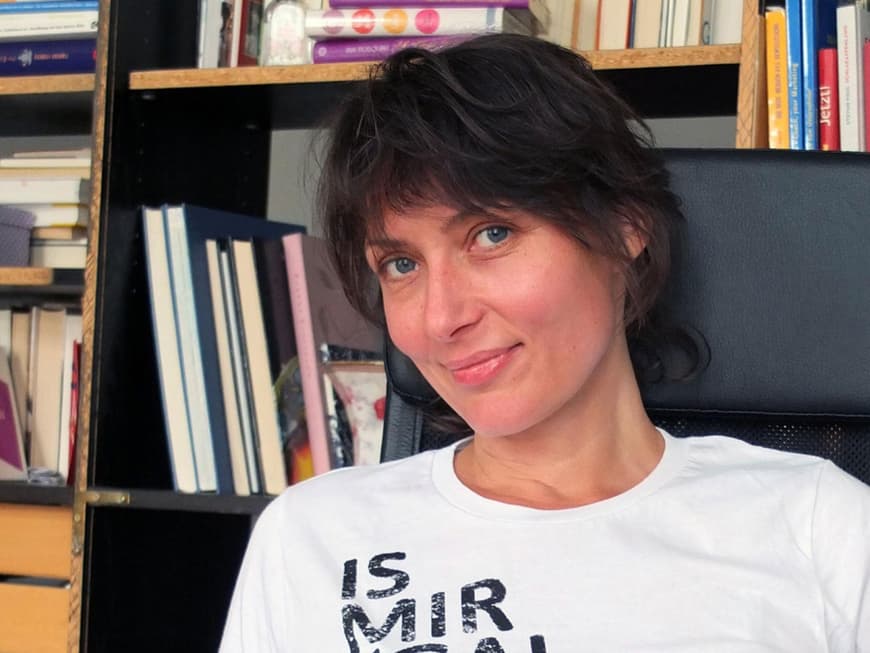I live in Berlin Kreuzberg on the border with Neukölln and a small tailor's shop opened there last summer. In the window of this store was a T-shirt with the inscription: "I don't care, I'll leave it like this". I wouldn't have noticed this shirt if my husband hadn't stopped in front of the store - and he never does that. He pointed at the T-shirt and said: "I like it". I couldn't understand what the appeal of this mousy gray piece was. It had a round neckline like the five euro normal shirts at H&M and had this meaningless slogan on it. Apart from the fact that I don't wear shirts with slogans on them anyway. I was even more surprised when, after a few weeks, every third person in the neighborhood was wearing this T-shirt, newspapers were printing it as hip and the slogan was even constantly quoted. I asked my husband what the magic of this item of clothing was and he gave me a highly sociological and philosophical answer, which I can only reproduce here: In our age of acceleration and perfection, it is important to break this chain of stress and not to want to make everything even better. It is often enough to simply leave things as they are. The time that is freed up could be used to have a coffee on the corner, sit around in the sun or otherwise relax. These days, there's a conspicuous lack of that. Yes, I thought, right, and bought myself one of these shirts.
I have been working with The Work of Byron Katie for 15 years, helping others to dissolve their stressful thoughts and see better, less stressful perspectives. Often people who come to me for an individual session or seminar have hardly any problems with other people or things. The biggest problem they have is with themselves. They go to great lengths to be a good person, to develop themselves, to be friendly and open-minded, helpful, generous, giving, committed and selfless. What's more, they want this path in life to be easy for them. It's nice to help others, to be useful, to be a good, loving, loyal partner, a helpful, hard-working colleague and a loyal, caring mother who always has an ear for her children. And it can only be good to do more sport, to be more well-read and therefore smarter. It's all so well-intentioned. And yet often so stressful.
Do I have to be better than I am?
Of course, making an honest effort has a good reputation. But how useful is this effort if it causes me pressure and stress? Isn't it counterproductive? Two weeks ago, a woman, I'll call her Claudia, came to me for an individual session with the following stressful thought: I have to be better. Claudia had already read so many books on the art of living, stress reduction and self-optimization and still didn't feel that she had become a better person. That tormented her a lot. Her husband also said that she could stop all this nonsense now and that she wouldn't have to throw so much money out the window on seminars that were useless. We challenged this belief with the four questions of The Work and ended up turning it into its opposite.
I asked her to relax, make herself comfortable and let the answers to the questions emerge in peace. Then I asked them the first question: Is this true? Is what you believe true? Is it true that you must be better? Claudia sat back, waited for her answer and then said, "Yes." I asked her the second question: Can you be absolutely sure, really one hundred percent, that your thought is true? That you must be better? I saw Claudia breathe a sigh of relief. She said: "No, not one hundred percent." And laughed. It looked like something was already relaxing in her body. Only because she couldn't be sure whether this thought that was bothering her was even true. The Work's third question was: How do you react when you believe this thought? Claudia groaned. "Oh, then there's this pressure on my shoulders and here in my chest. And I don't understand it. I want something good. I get irritated and annoyed and see what I can't do. I see my husband shaking his head and I would love to prove to him that the seminars are not in vain. Phew... That's pretty stressful." And who would you be without this thought? With that, I asked Claudia the fourth question of The Work: If you no longer believed that you had to be better than you are right now? Claudia seemed confused. "Without the thought? But then I would stop working on myself and that wouldn't be good ..." Ok, I said and brought her back to the fourth question: In those moments when you don't manage to be better (because only in those moments does the thought 'I should be better' even arise), who would you be in those moments if you didn't believe that you had to be better? "Oh!" said Claudia, "that would be fantastic!" She breathed in and a big laugh spread across her face. "Great! Then I'd just be the way I am right now. Then I wouldn't have to be any different and that would totally relax me."
The reversal of the thought
Yes, I said, that brings us straight to the first reversal: I don't have to be better. Why is that true? Can you give me an example? "Well, because the thought causes me so much stress and pressure! I can see that now. I don't have to be better if I can't do it right now. Because then it's not working right now..." she said and laughed. "Oh, that's a nice feeling." Do you have another example of why this reversal, i.e. the opposite of your stressful thought, is true for you? "Actually," said Claudia, "nobody asked me to be better. That was just my idea. And it was actually born out of a desire to make my life more relaxed. Wow! And now I've been tinkering with it for so long that this well-intentioned thing is causing me stress again. Crazy!" Can you think of a third example of the reverse, that you don't have to be better? "Yes, well, to be honest, I don't even know what 'better' actually means. What is that supposed to be? Better than who? Better than what? What I really want is to enjoy life more. That's what it is! Like now!" She laughed again. "Without stressing myself out!" I stood up and showed her my T-shirt. "No shit!" she said and was amazed. "Funny!" A week later, I received an email from Claudia. She was still happy that she no longer had to be better. She could now apply everything she had learned in seminars and books. If she wanted to. If there was no pressure. And if she didn't feel like it, she could simply hold her nose in the sun. Incidentally, her husband was also very happy with this arrangement.
In her book "I need your love - is that true?", Byron Katie describes how beautiful our lives sometimes are. How we might be sitting in an armchair and have caught a moment when everything is good and very cozy. We do nothing more than enjoy this moment. Until the thought arises that it could be a little more comfortable if we were to get another cushion ... Under the heading: "The thought that drives you out of paradise", she writes: "Without this thought, you are in paradise - you are simply sitting in your armchair. What do you experience when you believe the thought that you are missing something? The immediate effect may be subtle - just a slight restlessness as your attention turns away from what you already have. In your search for comfort, you make yourself uncomfortable. Most people are so eager to make improvements that they don't even realize when they've left paradise. Wherever they are, something or someone could always be better."
Don't put off being happy
Thinking about what I should be doing, how I should be, how I should look (if only I made an effort, exercised a bit more and cut down on my eating) and how my life should be keeps me on my toes. They suggest to me that I need to do something before I can feel good and relax. I keep putting off my happiness until later. To a time when I have made myself a better person, when everything is optimized and I have finally learned to pull myself together. But when will that be?
Yes, humanity wants to develop, not stand still, always moving forward and faster, further, higher. And if I feel joy, pleasure and curiosity in the process, it's not a burden at all. But as soon as a "must", "ought to", "should" or "actually" appears, it is usually a thought that triggers stress. A thought of self-optimization. It may be well-intentioned, but it is not easy to put into practice. With the help of The Work, we can find, check and usually dissolve such stressful beliefs. The burden is then replaced by something more useful and peaceful. Something that brings more joy into life. And when there is more joy in my life, I usually don't worry so much about what needs to be better. Then I just live. And that is wonderful. Simply wonderful.









